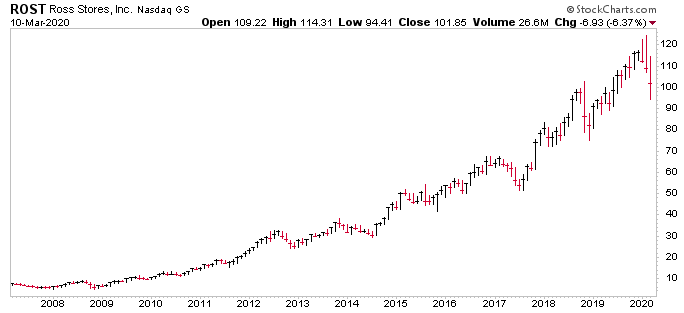Why I Don’t Worry About Bear Markets

What Everyone Ought to Know About Bear Markets
Let’s rap about bear markets.
Over the past few weeks, fears of the coronavirus pandemic have walloped the economy. Business has frozen in epicenters like China and Italy. Elsewhere, analysts have started raising the odds of a worldwide recession as consumers hunker down, avoid public places, and dial back their spending.
That fear has spread throughout the financial system. On March 9, the S&P 500 index closed 19% down from its February 19 record high. That comes within a whisker of bear market territory, defined as a drop of 20% or more from the prior peak.
Here’s the thing: bear markets are actually good for investors. Sure, no one likes to see paper losses in their portfolios. But for those following the right playbook, moments like these are probably the best times to be an investor.
To be clear, I don’t enjoy the idea of profiting off the misery of others. The coronavirus, which has already killed thousands of people, could end up harming millions. I worry for my friends, family, and colleagues, as well as the health of others in my community.
Furthermore, a pandemic has the potential to rock the financial system. Short-term, you have the obvious impact on travel industries like hotels, airlines, and cruise ships. Long-term, any recession would push hundreds of indebted corporations and governments to the financial brink.
But while a bear market will rock investors’ portfolios, these situations can provide a preview of the winners in the next business cycle.
During a downturn, some stocks resist the sell-off. They still drop, of course. But while the majority of names retreat on the first sign of trouble, these stocks give ground only grudgingly. You can almost feel them straining their muscles to the point of exhaustion, trying to resist the wider market slide.
The explanation, of course, is obvious: these stocks often represent the businesses or industries whose earnings point sharply higher. Even in a bear market, capital continues to flow into these companies. And more often than not, they lead the way higher when the economy rebounds.
I often describe these situations as coiled springs. In a recession, the weight of pessimism keeps a weight on the share prices of these companies. The more the market drops, the more the tension builds. But as soon as the burden of the bear market lifts, these names can vault higher.
The thing is, these opportunities only get created during a correction. That’s why you can never give up on the stock market’s potential.
America will always bounce back. The country has gotten through things much worse than a virus.
During downturns, entrepreneurs reallocate capital into new businesses and opportunities. That explains why recessions can often trigger a wave of innovations, creating fortunes for investors over the following years.
We saw such a situation in the last business cycle with Ross Stores, Inc. (NASDAQ:ROST). During the last financial crisis, traders fled equities. Ross Stores, however, held up just fine.
Why? America has increasingly become a nation of “have’s” and “have nots.”
With households at the bottom becoming increasingly cost-conscious in their shopping habits, that created an opportunity for discount retailers like Ross Stores. And over the next decade, ROST was one of the best stock market performers.

Chart Courtesy of StockCharts.com
And Rost Stores isn’t the only example, either. The financial crisis created “coiled spring” situations in dozens of other stocks. Over the following years, investors earned triple-digit gains in dividend stocks like McDonald’s Corp (NYSE:MCD) and Extra Space Storage, Inc. (NYSE:EXR).
Which stocks could lead the market higher this time around? The recent action offers some clues.
Cell phone tower owners like American Tower Corp (NYSE:AMT) and Crown Castle International Corp. (NYSE:CCI) have held their ground. These partnerships stand to profit from the coming rollout of “5G” mobile technology. In December, I even called this the “biggest dividend investment opportunity of 2020.”
“The market for 5G technology and services worldwide could reach $2.4 trillion in direct contributions over the next few years,” I wrote in that Income Investors column. “Cell phone towers constitute just one of many ‘pick and shovel’ dividend investment opportunities.”
Discount retailers like Walmart Inc (NYSE:WMT), Dollar General Corp. (NYSE:DG), and Costco Wholesale Corporation (NASDAQ:COST) have performed well, too. These firms should hold up in any pandemic-induced recession. And like Rost Stores, they benefit from a growing number of struggling households looking to stretch their budgets.
Finally, take a look at the action in Equinix Inc (NASDAQ:EQIX), CoreSite Realty Corp (NYSE:COR), and Digital Realty Trust, Inc. (NYSE:DLR). These partnerships own hundreds of data centers, which they lease out to companies for rental income. With our world becoming increasingly digital, demand for these spaces looks poised to grow.
Of course, I don’t know when the current bear market will end. I also don’t know for sure which stocks will lead the way higher in the next cycle. But this recent correction provides clues as to what those winners could be.
Stay positive. Be alert. Watch for coiled springs.
The biggest investment opportunity of your life could be just around the corner.











